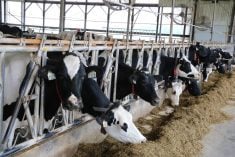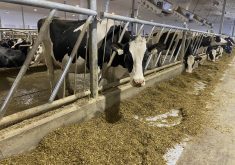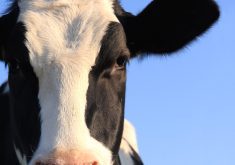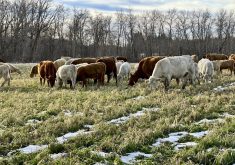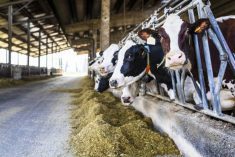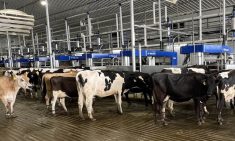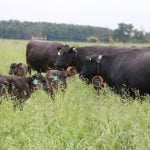It’s unlikely any Manitoba product will pass through the milk concentration plant being built in central Alberta through the efforts of the Western Milk Pool, but the pool’s chair still counts it a win for the sector.
Henry Holtmann, who is both WMP chair and heads the board of the Dairy Farmers of Manitoba, said expanded processor capacity has a cascading effect, even if it is two provinces away.
“Since we share all the revenues as a pool and we share the markets, if processor expansion in another province results in growth in another province, that grows the Western Milk Pool pie, and we all have part of that pie,” he said.
Read Also

Trade uncertainty, tariffs weigh on Canadian beef sector as market access shifts
Manitoba’s beef cattle producers heard more about the growing uncertainty they face as U.S. tariffs, and shifting trade opportunities, reshape their market.
Why it matters: Once built, Dairy Innovation West will be the first facility of its kind in Canada. It will also be the first major capital project built by the Western Milk Pool.
The $70-million Dairy Innovation West facility is gaining momentum after breaking ground last August.
“We have shovels in the ground as of now, pilings in and we’re getting ready as winter approaches,” the pool’s CEO Nolan Berg said at a December dairy conference in Winnipeg. “We’re getting that all set up so that we are in a great position to move forward in spring.”
Construction is expected to be completed by the end of 2024 and, after a window to test the equipment, the facility should be up and running by mid-2025.
Project roots
The project was first announced in 2019 as part of a commitment for pool members to work more closely together and expand processing capacity. At the time, it was estimated to be complete by March 2021.
Some of those delays can be chalked up to the pandemic, but Holtmann said the biggest challenges were regulatory.
The WMP is not a legal entity and therefore cannot own the facility. Instead, Dairy Innovation West is co-owned by the provincial organizations that make up the pool. That opens the door to a patchwork of provincial rules.
“The biggest hurdle was finding a way that would respect the provincial regulations of the four provinces,” Holtmann said. Those nuances were tougher to navigate than the board initially expected.
“It’s been an interesting path because, as soon as we thought we had something that would work, we would test the waters, and then a provincial lawyer says, ‘no, you can’t do it that way,’ so we would have to adjust and change,” said Holtmann. “So, it takes time to do that.”
One of the regulatory challenges stemmed from B.C. Milk Marketing Board regulations, which don’t permit it to be involved. The WMP is made up of five dairy groups across four western Canadian provinces: the B.C. Milk Marketing Board, the B.C. Dairy Association, Alberta Milk, SaskMilk, and Dairy Farmers of Manitoba.
“They have a different structure in British Columbia; they have two organizations,” Holtmann said. “One is their marketing board. The other is their producer association. We found that we could work through their producer association, and that worked just fine.”
The central-Alberta location near Blackfalds was chosen to address the need for more dairy processing in Alberta. There is not enough capacity to accommodate the volumes of milk produced in the province, and milk sometimes goes to Abbotsford, B.C., or even as far as Manitoba to be processed.
Dairy farmers cover the transportation costs to get milk to the door of the processor, so longer journeys can reduce farm profitability.
Dairy Innovation West is meant to form a bridge between the farm and those distant plants. Milk coming into the facility from member farms will be concentrated, making it easier to ship to end-use processors. The milk concentrates from the facility are not owned by the WMP.
Depending on the process, the facility could take milk from as many as four trucks and concentrate it to one truckload.
“It really supports processor expansion and reduces transportation costs for the farmers to get the milk to the door of that processor,” said Holtmann.
The facility will use reverse osmosis (RO) and ultrafiltration (UF) to make RO concentrated whole milk, RO concentrated skim milk, UF whole and skim milk, milk protein isolate concentrates, milk permeate concentrate and cream.
“RO is really dewatering the milk. Ultrafiltration actually can concentrate the protein fractions, which is important for cheesemaking,” Holtmann said, adding that the facility will be able to “concentrate about 300 million litres of raw product into its various components per year.”
Dairy producer Gerrit Haarman, owner of Coulee View Farms north of Lethbridge, Alta., said the project is a win-win from both a cost and environmental perspective.
“Any time there’s less trucks on the road, that should translate into a saving,” he said.
“From my point of view, the environmental advantage is something that I really think will benefit us just by having less trucks transporting milk.”
It also portrays the western Canadian dairy industry in a positive light.
“I just think it’s a fantastic project that shows producers in Western Canada being able to come together and find a solution for a problem that affects all of us dairy producers in Western Canada. I think that just shows great potential.”
– With files from Jeff Melchior




